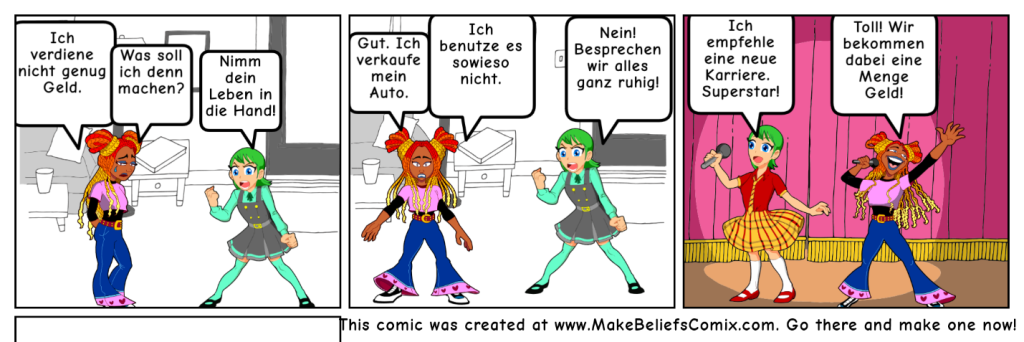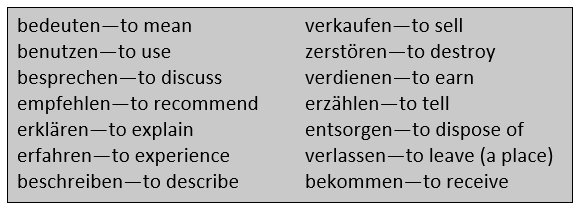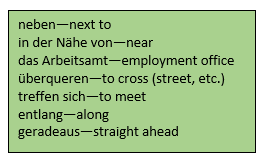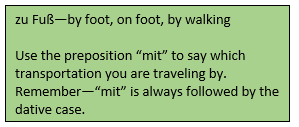10 Section 5-1: Inseparable Prefix Verbs
5-1: Inseparable Prefix Verbs
In Chapter 4, you learned about separable prefix verbs, such as anrufen and zurückkommen.
Rufst du deinen Mitbewohner an?
Er kommt am Donnerstag zurück.
The verb is conjugated as always for the subject, and the prefix moves to the end of the sentence.
Similarly, there are a few prefixes that you will see on verbs that do NOT move to the end of the sentence. In fact, you have already been using several of these inseparable prefix verbs and not realized it. They conjugate just like a normal verb.

For example, the verb verstehen, to understand, would be conjugated as follows.
Ich verstehe. Wir verstehen.
Du verstehst. Ihr versteht.
Er/sie/es versteht. Sie/sie verstehen.
The inseparable prefix ver– does not get kicked to the end. Anytime you see a verb that begins with the inseparable prefixes in the orange box above, you will NEVER kick them to the end of the sentence.
“Then why bother telling us this if they’re no different from any other verbs?” you may be thinking. Later on, it will make a difference when you learn the perfect tense, aka conversational past, which is also in this chapter. It’s good to learn the difference between separable and inseparable prefix verbs now.
Click to see me reteaching this:
To see a review of both separable and inseparable verbs, watch YourGermanTeacher’s video:

For now, here are a few new verbs that use the inseparable prefixes listed above. (Plus a few old ones that you may have forgotten!)


Ex. C: Übersetzung. Übersetzen Sie ins Englische.
- Grandma, will you tell me a story?
- We will experience a lot in Europe.
- What does that mean?
- Describe your German professor.
- You should get rid of the trash.
- Don’t leave the university!
- This backpack belongs to her.
- Can you recommend me a restaurant?
- The children are destroying their room.
- We like this movie. (Hint: use gefallen).
- Many students get money from their parents
- Other students earn money.
Ex. D: Nicos Weg. Episode 42: An der Ampel links. Watch the video and do the activities online. You will review giving directions and the imperative, which you learned in Chapter 3.
https://learngerman.dw.com/en/an-der-ampel-links/l-37595076
Ex. E: Nicos Weg. Episode 43: Mit Bus und Bahn. Watch the video and do the online activities.
https://learngerman.dw.com/en/mit-bus-und-bahn/l-37595395 
Ex. F: Nicos Weg. Episode 44: Im Büro. Watch the video and do the activities. You will learn the words for things in an office and some new prepositions.
https://learngerman.dw.com/en/im-b%C3%BCro/l-37595501

Ex. G: Nicos Weg. Episode 45: Lebensmittel. Watch the video and do the activities online. You will review food words and when to use nicht or kein-, which we did in Chapter 2.

